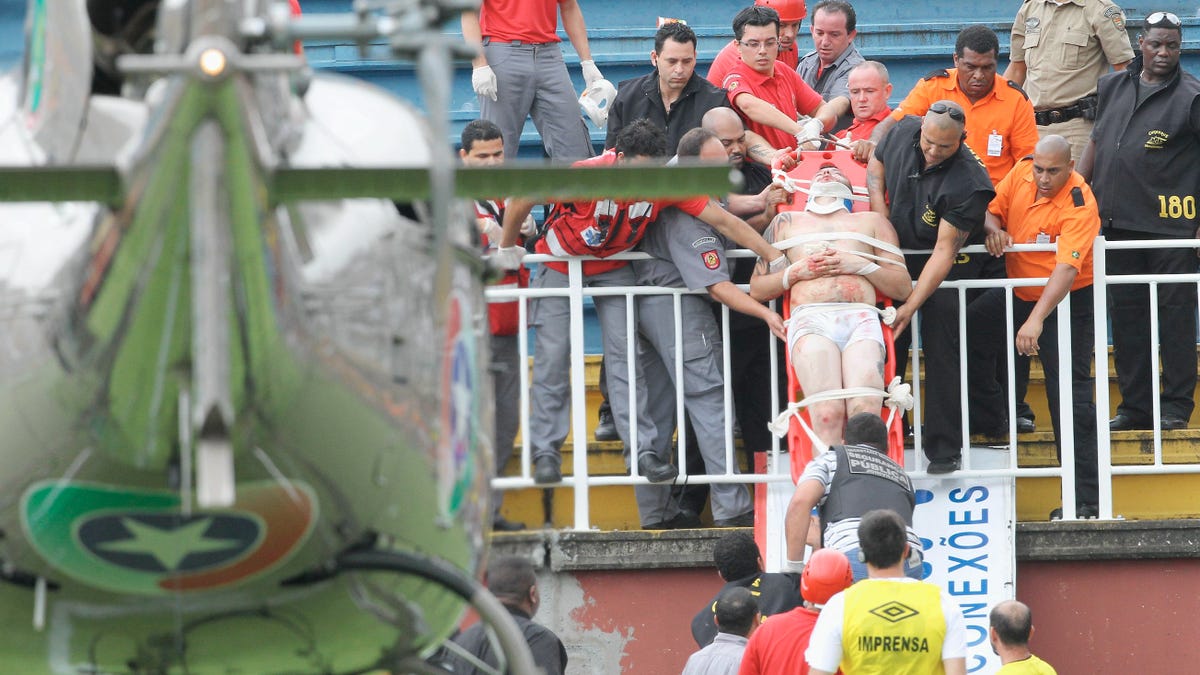
An injured fan is carried on a stretcher after clashes with team fans during a Brazilian league soccer match between Atletico Paranaense and Vasco da Gama in Joinville, southern Brazil, Sunday, Dec. 8, 2013. A key Brazilian league match was stopped Sunday after fans started fighting in the stands and a helicopter had to land on the pitch to airlift a seriously injured man. A doctor said two other fans were hospitalized in serious condition and one was treated for a minor injury at the stadium. (AP Photo/Carlos Moraes, Agencia O Dia) (The Associated Press)
SAO PAULO – With disturbing images of fans hitting each other shown across Brazil, soccer's governing body downplayed the risk of violence inside stadiums during the World Cup.
FIFA condemned the mayhem in the southern city of Joinville, where fan fighting halted a decisive Brazilian league match for more than an hour Sunday. Four people were hospitalized, including one person who was airlifted from the field.
"This is very sad for Brazilian football," FIFA said in a statement to The Associated Press on Monday. "FIFA and the local organizing committee condemn any form of violence and such incidents should not happen in any football stadium."
The violence came only two days after FIFA held the draw for the 2014 World Cup with an extravagant ceremony in a resort in northeastern Brazil.
Hundreds of fans from Atletico Paranaense and Vasco da Gama charged each other in Joinville, throwing kicks and punches while armed with sticks and metal bars. The fighting forced the referee to stop the match about 17 minutes into the first half.
Security in Joinville was handled by private guards instead of police, similar to what is planned for the World Cup. Only stewards are in charge of fan safety inside stadiums during FIFA events, with authorities usually in charge of security outside the venues.
Sunday's fighting stopped only after police arrived, firing rubber bullets to disperse the crowd.
FIFA said it could not comment on what happened in Joinville because it was not involved in the match, but noted it is confident with its World Cup security plans.
"For the 2014 FIFA World Cup a very comprehensive security concept is in place in an integrated operation between private and public security authorities to ensure the safety for fans, players and any other stakeholder involved in the event," the governing body said "The concept has worked very well during the FIFA Confederations Cup and is built on models used at previous FIFA World Cups."
At the Confederations Cup in June, police and soldiers fired tear gas, rubber bullets and shock grenades at rock-throwing demonstrators. Six died in connection with the violence of that tournament, a warmup for the World Cup.
Most of FIFA's security concerns for next year's event have been focused on protests outside the venues, but the recent violence inside Brazilian stadiums is likely to lead to some apprehension. Even though rival fan groups common to club matches are not expected during World Cup games, it was clear Sunday that the nearly 80 security guards separating the factions in Joinville were not in position to contain the violence.
Brazilian President Dilma Rousseff said Monday the sports ministry was involved in the case. She decried the lack of punishment in cases of fan violence in Brazil.
"The country of football cannot live with violence in stadiums anymore," Rousseff said on Twitter. "We need police in the stadiums."
Newspapers on Monday showed gruesome images of fans being stepped on, some of them motionless as rival supporters continued to pound them from every side. Some fans pulled away from their groups were attacked by up to 20 rivals. A police helicopter had to land on the field of the Arena Joinville to airlift a man with a serious head injury.
Three of the seriously injured men remained hospitalized Monday, but none of their injuries was life threatening, according to the Hospital Sao Jose. Police said they detained three people Sunday.
The match, which earned Atletico Paranaense a place in next year's Copa Libertadores and led to Vasco da Gama's relegation, was played in Joinville instead of Atletico's base in Curitiba because the club had already been punished for fan violence earlier this year.
Several other cases of fan violence have hit the World Cup host country in recent months, with champion Cruzeiro, Vasco da Gama, Corinthians and Palmeiras all losing home games because of confrontations inside and outside stadiums. Cruzeiro's title celebrations a few weeks ago had to be canceled because of fan fighting on the streets of Belo Horizonte.
"We need to do something about this or it will never stop," Atletico Paranaense defender Luiz Alberto said. "This is a World Cup country. Things need to change."
___
Follow Tales Azzoni at http://twitter.com/tazzoni
